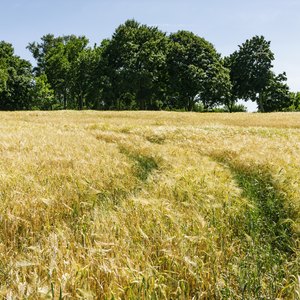
The IRS understands that farm income can fluctuate due to weather, crop loss and other issues beyond a farmer's control. However, in order to be considered a for-profit business (as opposed to a hobby), your farm must produce a profit within a certain time frame as defined by IRS regulations. Claiming several consecutive years with reported farm loss could disqualify you from taking future business deductions for your farm.
Tips
The IRS stipulates that you can typically claim three consecutive years of farm losses. In some situations, however, four consecutive years of claims may be possible.
Allowable Farm Losses
You can claim a farm loss for three consecutive years. In some cases, you are able to claim four consecutive years. The three or four consecutive years are write-offs against other business interests. However, once you have reached your maximum time limit, any future losses are only claimed against future profits gained by farming.
Hobby Farm vs. Farm Business
One of the ways that Congress decided to separate individuals who are engaged in farming as a business from people wanting to be "hobby" farmers was to enact a clause requiring the taxpayer to show there is a presumption of profit. This keeps people with a hobby from being able to write off all the expenses of the farm from their income taxes. A farm is considered to be an actual business, rather than a hobby, if it shows a profit for three years of a consecutive five-year period. If the farm is designed for businesses related to breeding, showing, or training racing horses, the presumption rule changes to needing to show a profit for two years in a consecutive seven-year period.
Changes Related to Subsidies
The farm loss restriction changed in 2011, preventing farmers from claiming an excess farm loss in the same year the farmer received an applicable subsidy. In other words, if a farm received a government subsidy in 2017, it could not claim the full amount of any losses incurred in 2017. The amount of the subsidy must be deducted from the losses before claiming them on the income tax form.
Exceptions for Start-up Farms
The IRS allows a certain amount of latitude for businesses, including farms, that are just starting out. Since there is a learning curve and start-up expenses for most businesses, the IRS allows a little flexibility during the early years of beginning a farm. However, certain conditions need to be met. For example, if someone is beginning to operate a farm, the IRS will likely ask for some proof that the person working the farm has some basic knowledge of farming. If that person doesn’t have the knowledge, someone within the business must know how to be a farmer.
References
- Denis Breen and Company: Farmers − Tax Planning
- IRS Tax Map 2017: Not-for-Profit Farming
- IRS: Ten Key Tax Tips for Farmers and Ranchers
- Congressional Research Service. "Agriculture: A Glossary of Terms, Programs, and Laws, 2005 Edition," Page 97. Accessed Jan. 27, 2020.
- Internal Revenue Service. "Publication 225 Farmer's Tax Guide," Page 8. Accessed Jan. 26, 2020.
- Internal Revenue Service. "Schedule F (Form 1040 or 1040-SR) Profit or Loss from Farming," Pages 1-2. Accessed Jan. 26, 2020.
- Internal Revenue Service. "Publication 225: Farmer's Tax Guide," Pages 18-24. Accessed Jan. 27, 2020.
- Internal Revenue Service. "Publication 225: Farmer's Tax Guide," Pages 1-2. Accessed Jan. 26, 2020.

